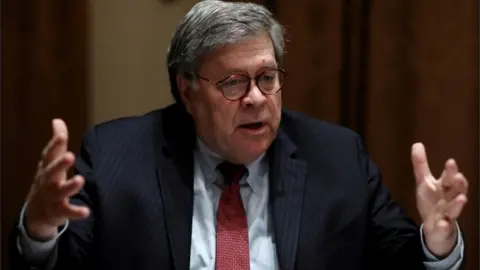US tech and film 'collaborating' with China - Barr
 Reuters
ReutersUS Attorney General William Barr has accused Hollywood and US tech firms of "collaborating" with the Chinese government to do business there.
Companies like Disney routinely agreed to censor films while Google, Yahoo, Microsoft and Apple were "all too willing" to work with Beijing, he said.
Such actions risked undermining the liberal world order, Mr Barr added.
His intervention is the latest criticism of China by White House and other US officials.
Tensions between the US and China have been rising over a host of issues. The US this week removed Hong Kong's preferential trade status, after China brought in a controversial new security law for the territory.
President Donald Trump has also criticised China over its handling of the coronavirus pandemic as well as its military build-up in the South China Sea, its treatment of Muslim minorities, and massive trade surpluses.
China has rejected all foreign criticism of its actions.
On Friday, in response to the latest allegations, its foreign ministry said US officials had "lost their minds and gone mad".
What did Barr say about US firms?
Speaking at the Gerald Ford Presidential Museum, he warned that dependence on China for certain goods risked making the US vulnerable and said US firms were giving up secrets and compromising values under Chinese pressure.
"If Disney and other American corporations continue to bow to Beijing, they risk undermining both their own future competitiveness and prosperity, as well as the classical liberal order that has allowed them to thrive," he said.
The justice department had seen growing numbers of cases where Chinese officials were lobbying US bosses to favour Beijing's policies, he said. He urged US firms to defy Chinese demands, saying: "If individual companies are afraid to take a stand, there is strength in numbers."
 Getty Images
Getty ImagesHe criticised technology companies, which he said had "allowed themselves to become pawns of Chinese influence".
He also alleged - without providing evidence - that the Chinese government was able to access Apple phones while the company had denied similar access to the US government, and that this was emblematic of a "double standard that has been emerging among American tech companies".
"Do you think when Apple sells phones in China, that Apple phones in China are impervious to penetration by Chinese authorities? They wouldn't be sold if they were impervious to Chinese authorities," he said.
Apple says it does not have a back door into its phones and will not build one.
Mr Barr also praised Facebook, Google, Twitter, and LinkedIn for saying they would not comply with requests for user data under Beijing's new security law in Hong Kong.
... and about China?
China's actions showed it did not want to join other industrialised economies but rather wanted to replace them entirely, he said.
Beijing sought to exploit the "power, productivity and ingenuity" of China's people to "overthrow the rule-based international system and to make the world safe for dictatorship".
China was engaged in an "economic blitzkrieg" to "seize the commanding heights of the global economy and to surpass the United States as the world's preeminent superpower", he added.

'A key pillar of Trump's re-election strategy'
Zhaoyin Feng, BBC Chinese, Washington DC
The Trump administration has long argued that China is taking advantage of America in trade. Mr Barr's remarks ramp up the accusation, alleging that China's ultimate goal in doing business with the US is to replace it and to become a world superpower.
"Win-win in China means China wins twice," he said.
Mr Barr's remarks are among a series of hard-hitting speeches by senior US officials on China, including FBI Director Christopher Wray and National Security Adviser Robert O'Brien, with Secretary of State Mike Pompeo expected to follow.
All advocating for a tougher stance against Beijing, some of these speeches were delivered in key swing states like Michigan and Arizona.
Two days ago, President Trump voiced a range of grievances against China during a Rose Garden press conference, which quickly turned into an hour-long monologue attacking his Democratic rival Joe Biden.
Campaign rhetoric and voices advocating for more hawkish policies towards China have become indistinguishable, as Mr Trump seems determined to make China a key pillar of his re-election strategy.

What does China say?
On Friday, a spokeswoman for China's foreign ministry said the country had no intention of replacing or challenging the US.
Hua Chunying also said officials in Washington criticised China to distract from domestic issues.
"These people, for self-interest and political gain, do not hesitate to hijack domestic public opinion... to the point where they have lost their minds and gone mad," she said.
And on Thursday, the foreign ministry accused the White House of unfairly targeting China.
"We know that some in the US are oppressing China and bullying China. As an independent sovereign state, China must respond to the bullying practices and we must say no, we must... take reactive moves to it," Ms Hua said.
She also responded to media reports that the US could ban Chinese Communist Party members from visiting the US, which she said were "utterly pathetic" if true.
The Communist Party is the country's sole, ruling political party.
About 7% of the population are members of the party - loyal membership is essential for those who want to climb the career ladder - and members include e-commerce giant Alibaba's Jack Ma, telecomm company Huawei's founder Ren Zhengfei and actress Fan Bingbing.
What else have US officials been saying?
Mr Barr's speech follows similar warnings about the impact of Chinese activity on the US by other US officials.
Earlier this month FBI director Christopher Wray said acts of espionage and theft by China's government pose the "greatest long-term threat" to the future of the US.
He said China had begun targeting Chinese nationals living abroad, coercing their return, and was working to compromise US coronavirus research.
"China is engaged in a whole-of-state effort to become the world's only superpower by any means necessary," Mr Wray added.
